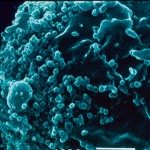Link to Pubmed [PMID] – 24131719
J. Virol. 2014 Jan;88(1):176-87
CD8(+) T cell responses are thought to play an important role during HIV infection, particularly in HIV controllers (HIC) in whom viral replication is spontaneously controlled without any treatment. We have demonstrated that CD8(+) T cells from these subjects are able to suppress viral replication in vitro. In parallel, HIV-specific CD8(+) responses were shown to be strong and of high quality, with proliferative abilities and cytotoxic capacities, in HIC. The HLA-B*57 allele, which is associated with a better clinical outcome in HIV infection, is overrepresented in HIC. However, we showed that these patients constitute a heterogeneous group that includes subjects who present weak suppression of viral replication in vitro and HIV-specific responses. We performed an extensive study of 101 HIC (49 HLA-B*57(+) and 52 HLA-B*57(-)) to determine the impact of HLA-B*57 on the HIV-specific CD8(+) response. The HLA-B*57-restricted response displayed better qualitative features, such as higher functional avidity, higher proliferation capacity, and a higher level of cytokine production, than responses not restricted by HLA-B*57. However, the highest frequencies of HIV-specific CD8(+) T cells were observed only in a subset of HLA-B*57(+) subjects. They were tightly associated with the ability to suppress viral replication in vitro. In contrast, the subset of HLA-B*57(+) subjects with a weak ability to suppress viral replication had significantly lower ultrasensitive viral loads than all the other groups of controllers. In conclusion, both HLA-B*57 and the amount of ultrasensitive viral load seem to play a role in HIV-specific CD8(+) T cell responses in HIC.



